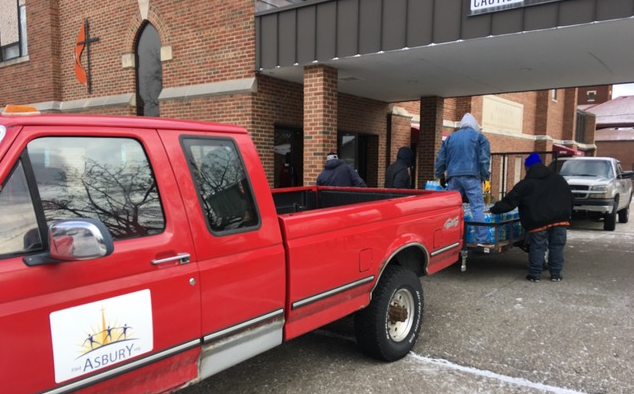A grant from the Bishop’s Appeal for Flint will buy a mini-bus to facilitate home delivery of water.
KAY DEMOSS
Senior Editor-Writer, Michigan Area
When people hear the name, “Flint,” their first thought is, “Crisis.” But Rev. Tommy McDoniel, pastor of Flint Asbury United Methodist Church, says that he wants their first thought to be, “Caring.”
“Yes, problems continue,” McDoniel begins, “but we often overlook the caring side. In some ways the worst circumstances here in the city have brought out the best in people.” Citing a new initiative FlintCares.com, the pastor is glad to be part of a movement to rebrand Flint from a place with problems to a place known for addressing their problems with compassion.
“The need for water will eventually end,” McDoniel says, “but the caring must go on for a lifetime.” And the United Methodists and other churches in Flint have been a trusted part of the caring response since the water emergency was first recognized. McDoniel says the State has called upon Asbury and other churches when they need a base of operation because, “They know that people feel better going to a place that’s familiar and that they consider safe.” Collaborations have abounded. Asbury partners with Mott Community College Workforce, the Chamber of Commerce, and Michigan Works among others. The common denominator is caring.
Asbury is one of eight United Methodist congregations that opened their buildings and their hearts to neighbors in need. In January 2016 the Crossroads District announced the opening of Water Resource Centers at those sites that are still operational today.
Now, a year later, needs for filters, test kits and bottled water are still being met. But the focus is shifting in a number of ways. PODs (points of distribution) have been efficient and effective. McDoniel estimates that Asbury still gives out about 1,000 cases of water a week from the parking lot.

“But we soon knew that many of our neighbors were not in those lines,” he remarks. So Asbury organized home delivery for those who have no car. “Water is heavy. Not possible to carry for someone traveling six blocks with a walker and impossible for the homebound.”
Rev. Paul Perez, Detroit Conference Director for Mission and Justice Engagement, reports that a grant of $14,500 has been made from the Bishop’s Appeal for Flint. Flint Asbury will use the money to purchase a mini-bus that will serve multi-purpose, delivering water and transporting people. Perez is part of an oversight group making allocations from the Bishop’s Appeal that includes contributions from United Methodists and others from around the globe. The Bishop’s Appeal for Flint stands at around $500,000.
At present, McDoniel’s 20-year-old Ford pickup is trucking water into the neighborhood. “At about 30 miles an hour,” he adds. There is a crew of six persons who make home deliveries every Friday, week in and week out, to between 125-150 households. The mini-bus will expand their ministry beyond moving pallets of water to serving passengers, giving rides to those needing medical attention or wanting to attend cooking lessons at the church.
Another way Asbury and other care-givers are assisting beyond bottled water involves meeting health needs, both physical health and mental health. Tracking done out of the University of Wisconsin Medical School has created a national database of health outcomes. McDoniel notes, “Their research shows, in terms of how long and how well people are living, Genesee County ranks last in the state. Reasons behind that ranking are poverty, environmental factors, substance abuse and things like access to fast food. “Flint is a food desert and changing that has been at the core of my ministerial call from the beginning,” the pastor asserts.
So Asbury’s weekly home deliveries include food. “The food is specifically chosen by healthcare professionals,” the pastor says, “for the way they mitigate the negative effects of lead.” Once lead is in the body it cannot be eliminated but some of the negative effects—impaired cognition, behavioral problems, high anxiety—can be reduced by eating foods rich in iron, calcium and vitamin C.
McDoniel has been in Flint for seven years and is well aware that malnutrition plagued the community well in advance of the water crisis. “We had lots of soup kitchens and food give-aways in the past,” he says, “but those were not focused on the nutrients that will keep lead from destroying lives. Ironically, the lead-contaminated water has brought things like good nutrition into focus in a way that now can be addressed positively.”
This means Flint’s children will be living longer lives. “United Methodists are stepping up to devastation and turning the situation around for the well-being of the community in the name of Christ,” McDoniel states.
As the churches address concerns for physical and mental health, spiritual care has not been forgotten. “When people come into the house of God for water or hear that a volunteer is a United Methodist, I know that touches their lives with something bigger and beyond this world,” McDoniel concludes.
~This is the first of a series of reports on how the Bishop’s Appeal for Flint is being invested in long-term solutions.
Last Updated on January 30, 2024

